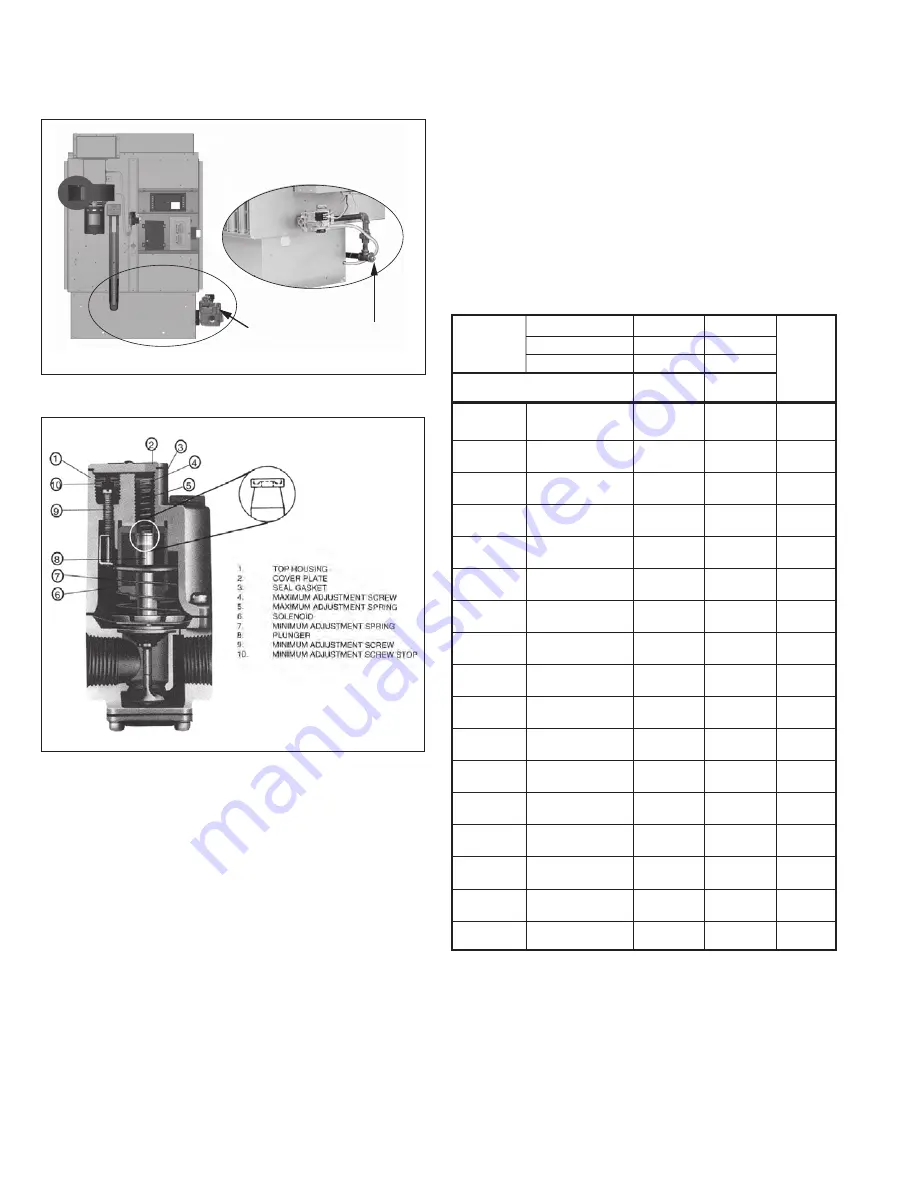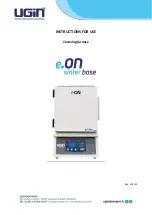
5-565.1
14
air shutter adjustment
Proper operation provides a soft blue flame with a well-defined
inner core. A lack of primary air will reveal soft yellow-tipped
flames. Excess primary air produces short, well-defined flames
with a tendency to lift off the burner ports. For both natural
and propane gas, the air shutters can be adjusted to control
the burner flame height. The air shutters can be accessed by
reaching behind the gas valve in Figure 14.1. The larger models
may require the removal of the manifold (see Manifold Assembly
Removal).
natural gas flame control
Control of burner flames on duct furnaces utilizing natural gas
is achieved by resetting the primary air shutters (See Figure
48.4) to either increase or decrease primary combustion air.
Prior to flame adjustment, operate duct furnace for about fifteen
minutes. The main burner flame can be viewed after loosening
and pushing aside the gas designation disc on the side of the
burner box.
To increase primary air, loosen the air shutter set screws and
move the air shutters closer to the manifold until the yellow-
tipped flames disappear. (See Figure 48.4 for air shutter and
start-uP Procedure
figure 14.1 - checking manifold Pressure with
“u” tube manometer
figure 14.2 - maxitrol modulating valve adjustments
heat exchanger support locations.) To decrease primary air,
move the air shutters away from the manifolds until flames
no longer lift from burner ports, but being careful not to cause
yellow tipping. Retighten set screws after adjustment.
Propane gas flame control
An optimum flame will show a slight yellow tip. Prior to flame
adjustment, operate furnace for at least fifteen minutes. Loosen
air shutter set screws and move the air shutters away from the
manifold to reduce the primary air until the yellow flame tips
appear. Then increase the primary air until yellow tips diminish
and a clean blue flame with a well defined inner cone appears.
model size
type of gas
natural
Propane
Btu/cu. ft.
1040
2500
specific gravity
0.60
1.53
High fire manifold Pressure
no. of
inches of Water column
3.5
10
orifices
Cfh
72.1
30.0
1
Orifice Drill Size
20
37
Cfh
96.1
40.0
2
Orifice Drill Size
30
45
Cfh
120.2
50.0
2
Orifice Drill Size
25
42
Cfh
144.2
60.0
3
Orifice Drill Size
30
45
Cfh
168.3
70.0
3
Orifice Drill Size
27
43
Cfh
192.3
80.0
3
Orifice Drill Size
23
40
Cfh
216.3
90.0
3
Orifice Drill Size
20
37
Cfh
240.4
100.0
4
Orifice Drill Size
25
42
Cfh
288.7
120.0
4
Orifice Drill Size
20
37
Cfh
336.5
140.0
6
Orifice Drill Size
27
43
Cfh
384.6
160.0
6
Orifice Drill Size
23
40
Cfh
240.4
➀
100.0
➀
4
Orifice Drill Size
25
42
Cfh
288.7
➀
120.0
➀
4
Orifice Drill Size
20
37
Cfh
336.5
➀
140.0
➀
6
Orifice Drill Size
27
43
Cfh
384.6
➀
160.0
➀
6
Orifice Drill Size
23
40
Cfh
336.5
➁
140.0
➁
6
Orifice Drill Size
27
43
Cfh
384.6
➁
160.0
➁
6
Orifice Drill Size
23
40
75
100
125
150
175
200
225
250
300
350
400
500
➀
600
➀
700
➀
800
➀
840
➁
➀
➀
➀
➀
➁
➁
960
➁
➀
Model contains 2 furnaces. Values shown are per furnace.
➁
Model contains 3 furnaces. Values shown are per furnace.
table 14.1 - manifold Pressure and gas consumption
Standard Controls
Premium Controls
Manifold Pressure Test Point















































